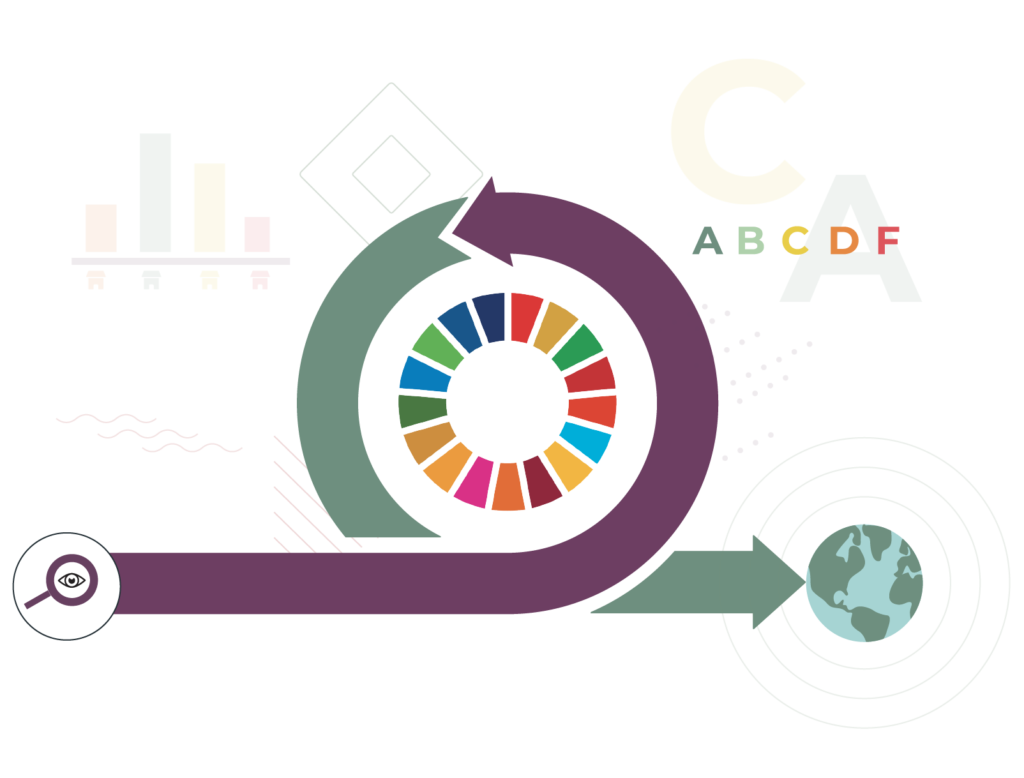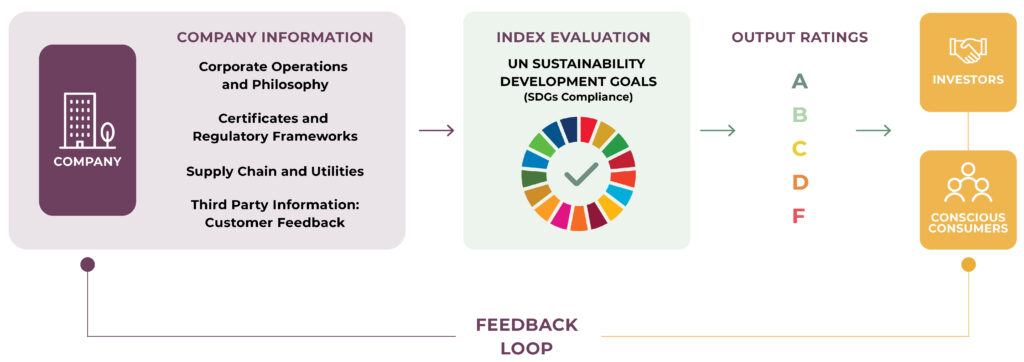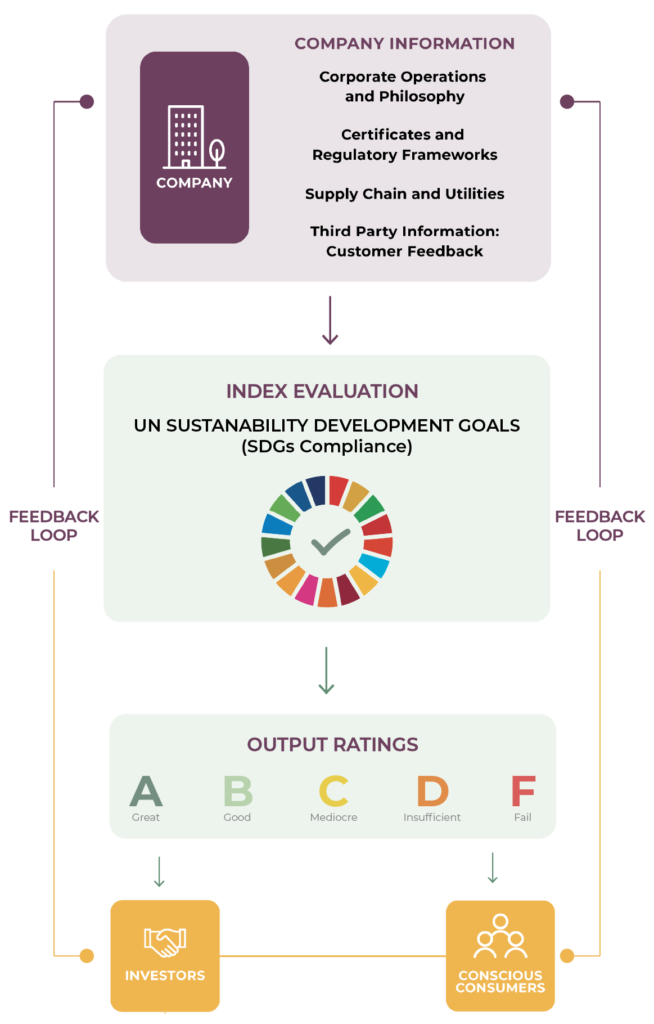Our Purpose
The Impakter Index is designed to arrive at an impartial and transparent evaluation of companies’ sustainability conduct, including the identification of misconduct and greenwashing.
Another aim of the tool is to encourage and facilitate business transformation though more sustainable practices and products, using the UN SDGs as a universal compass that overcomes national and regional differences in sustainability regulation.
This tool follows a bottom-up approach in fostering change in the field of sustainability and business compliance. This approach hopes to leverage change especially for SMEs, which in Europe alone represent 93% of the registered companies and face specific challenges in this matter.


Our Purpose
The Impakter Index is designed to arrive at an impartial and transparent evaluation of companies’ sustainability conduct, including the identification of misconduct and greenwashing.
Another aim of the tool is to encourage and facilitate business transformation though more sustainable practices and products, using the UN SDGs as a universal compass that overcomes national and regional differences in sustainability regulation.
This tool follows a bottom-up approach in fostering change in the field of sustainability and business compliance. This approach hopes to leverage change especially for SMEs, which in Europe alone represent 93% of the registered companies and face specific challenges in this matter.
LEARN MORE ABOUT THE METHODOLOGY BEHIND IMPAKTER INDEX AS A SUSTAINABILITY REPORTING TOOL
Impakter Index as a sustainability reporting tool


The Index Methodology
What makes Impakter Business Solutions unique is its grounding in the Impakter Sustainability Index. The Index methodology and vision were developed over several years by a multidisciplinary team of experts inside Impakter. Some parts of it are still a work-in-progress as they are further refined by the team, working on several fronts. We are collecting anonymized data about 29.000 companies in the sectors across several key institutional actors such as ACCREDIA, the Italian accreditation body who is part of IAF, the International Accreditation Forum. The purpose of this exercise is to draw lessons about how best to achieve sustainability and in the most efficient manner. In this way, our knowledge is continually expanded and kept up-to-date.
The evaluation of key information is structured into Five Pillars (or components) of a company’s sustainability performance, which, added up, provide the allocation to the company of a score on an INDEX (rating system). A 5 Pillar structure is also imperative as it can be tailored to varying company sizes. These pillars are:
Pillar I - UN Sustainability Development Goals (SDGs Compliance)
Verification of the degree of a company’s degree of “UN SDGs compliance” with the UN Sustainable Development Goals. We’ve completed a complex analysis of the 17 Goals and 169 Targets for every specific ISIC code to best understand how a company and industries can be compliant.
Pillar II - Certificates
Evaluation of the whole range of ISO Standards, Eco Label certificates and the Standard maps in terms of their relevance, from top sustainability certificates to industry-specific certifications.. We value process, Management and HR, product certificates and labels that represent a clear engagement and distinction between companies.
We took the effort of dedicating a certificates research team to
- match certificates with SDG targets based on what certificates cover and differentiate between primary, secondary and tertiary certificates, according to their relevance.
- identify which certificates are valid and desirable as proofs of sustainability and which are not. This is key to building up trust among consumers and avoiding accusations of greenwashing.
Check out also our certification database to discover which certificates, eco labels and standards we consider for our rating, worldwide.
Pillar III - European Union Regulatory System
We mapped the entire regulatory system of the EU in order to match each regulation with SDGs targets, on one hand, and ISIC codes on the other. Thanks to this classification effort, for every business we can formulate regulation-based suggestions on how to improve their sustainable status by working on their processes and products.
All this, without compromising the business model strategised by the management.
Pillar IV - Customer Satisfaction and Online Reputation
Third-party information about the company (public image derived from articles in the press and social media) and consumer views and reputation (derived from the internet) are all sources of information external to the company that tell a story about the company. Based on our findings and analysis, we can also improve the company´s personal brand identity with our Impakter Media platform.
Pillar V - Company Operations & Philosophy Assessment
Evaluation of a company’s year-end report and third-party reviews and assessments is carried out, to confirm on-going efforts to move towards a more sustainable business model. We take in account the company’s operations and business strategy based on their year-end report and external resources that can speak to the company’s ongoing efforts to move towards a sustainable framework.
The Evaluation
The evaluation happens through a hybrid system that combines AI with human expertise: a first round using an objective algorithm is followed by a second round of in-depth human assessments to fine-tune the overall evaluation process. The work is carried out by our team of dedicated sustainability analysts who also use the insights and experience of our marketing experts.
The result is an assessment of where a company stands on its path to sustainability. By the same process, a company can get advice tailored to its needs: a pathway to transform it into a fully sustainable company is created, with no possibility of greenwashing accusations. This is what Impakter Business Solutions are about: providing tailored guidance for any companies desirous to become sustainable.
When a company has achieved sustainability, it not only obtains a high sustainability ranking on the Impakter Index (A or B), but a range of benefits: access to green finance, an improved value chain, and trust among consumers and investors is built up, making it easier to sell to a broader market and raise funds.
Once the company has gained sustainability status, the second phase of Impakter Business Solutions begins and our experienced marketing team stands ready to assist in giving exposure and communicating the newly gained green rating to the markets.

A Rating: Companies have primary certificates for their entire business, valuable awards and rankings, clear and detailed sustainability agenda: KPIs, objectives, progress and target specific SDGs.
B Rating: Companies have specific certificates, some awards and rankings, easy-to-find sustainability reports and sustainability agendas: transparent goals and progress, target specific SDGs.
C Rating: Companies take part in unsustainable activities. They provide clear and thorough sustainable agenda, SDGs targets. They hold some certificates, awards and appear in some rankings.
D Rating: Companies are engaged in unsustainable activities. They lack transparency, goals and progress, SDGs targets. They do not hold certificates or awards. However, some effort and communication can be seen.
F Rating: Companies are not engaged towards sustainability at all. They do not possess a sustainability report, they do not appear in any rankings, have neither certificates nor awards.
The Index Methodology
What makes Impakter Business Solutions unique is its grounding in the Impakter Sustainability Index. The Index methodology and vision were developed over several years by a multidisciplinary team of experts inside Impakter. Some parts of it are still a work-in-progress as they are further refined by the team, working on several fronts. We are collecting anonymized data about 29.000 companies in the sectors across several key institutional actors such as ACCREDIA, the Italian accreditation body who is part of IAF, the International Accreditation Forum. The purpose of this exercise is to draw lessons about how best to achieve sustainability and in the most efficient manner. In this way, our knowledge is continually expanded and kept up-to-date.
The evaluation of key information is structured into Five Pillars (or components) of a company’s sustainability performance, which, added up, provide the allocation to the company of a score on an INDEX (rating system). A 5 Pillar structure is also imperative as it can be tailored to varying company sizes. These pillars are:
Pillar I - UN Sustainability Development Goals (SDGs Compliance)
Verification of the degree of a company’s degree of “UN SDGs compliance” with the UN Sustainable Development Goals. We’ve completed a complex analysis of the 17 Goals and 169 Targets for every specific ISIC code to best understand how a company and industries can be compliant.
Pillar II - Certificates
Evaluation of the whole range of ISO Standards, Eco Label certificates and the Standard maps in terms of their relevance, from top sustainability certificates to industry-specific certifications.. We value process, Management and HR, product certificates and labels that represent a clear engagement and distinction between companies.
We took the effort of dedicating a certificates research team to
- match certificates with SDG targets based on what certificates cover and differentiate between primary, secondary and tertiary certificates, according to their relevance.
- identify which certificates are valid and desirable as proofs of sustainability and which are not. This is key to building up trust among consumers and avoiding accusations of greenwashing.
Check out also our certification database to discover which certificates, eco labels and standards we consider for our rating, worldwide.
Pillar III - European Union Regulatory System
We mapped the entire regulatory system of the EU in order to match each regulation with SDGs targets, on one hand, and ISIC codes on the other. Thanks to this classification effort, for every business we can formulate regulation-based suggestions on how to improve their sustainable status by working on their processes and products.
All this, without compromising the business model strategised by the management.
Pillar IV - Customer Satisfaction and Online Reputation
Third-party information about the company (public image derived from articles in the press and social media) and consumer views and reputation (derived from the internet) are all sources of information external to the company that tell a story about the company. Based on our findings and analysis, we can also improve the company´s personal brand identity with our Impakter Media platform.
Pillar V - Company Operations & Philosophy Assessment
Evaluation of a company’s year-end report and third-party reviews and assessments is carried out, to confirm on-going efforts to move towards a more sustainable business model. We take in account the company’s operations and business strategy based on their year-end report and external resources that can speak to the company’s ongoing efforts to move towards a sustainable framework.
The Evaluation
The evaluation happens through a hybrid system that combines AI with human expertise: a first round using an objective algorithm is followed by a second round of in-depth human assessments to fine-tune the overall evaluation process. The work is carried out by our team of dedicated sustainability analysts who also use the insights and experience of our marketing experts.
The result is an assessment of where a company stands on its path to sustainability. By the same process, a company can get advice tailored to its needs: a pathway to transform it into a fully sustainable company is created, with no possibility of greenwashing accusations. This is what Impakter Business Solutions are about: providing tailored guidance for any companies desirous to become sustainable.
When a company has achieved sustainability, it not only obtains a high sustainability ranking on the Impakter Index (A or B), but a range of benefits: access to green finance, an improved value chain, and trust among consumers and investors is built up, making it easier to sell to a broader market and raise funds.
Once the company has gained sustainability status, the second phase of Impakter Business Solutions begins and our experienced marketing team stands ready to assist in giving exposure and communicating the newly gained green rating to the markets.

A Rating: Companies have primary certificates for their entire business, valuable awards and rankings, clear and detailed sustainability agenda: KPIs, objectives, progress and target specific SDGs.
B Rating: Companies have specific certificates, some awards and rankings, easy-to-find sustainability reports and sustainability agendas: transparent goals and progress, target specific SDGs.
C Rating: Companies take part in unsustainable activities. They provide clear and thorough sustainable agenda, SDGs targets. They hold some certificates, awards and appear in some rankings.
D Rating: Companies are engaged in unsustainable activities. They lack transparency, goals and progress, SDGs targets. They do not hold certificates or awards. However, some effort and communication can be seen.
F Rating: Companies are not engaged towards sustainability at all. They do not possess a sustainability report, they do not appear in any rankings, have neither certificates nor awards.


